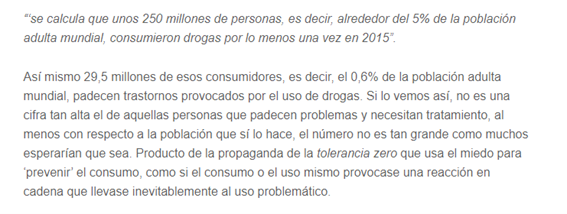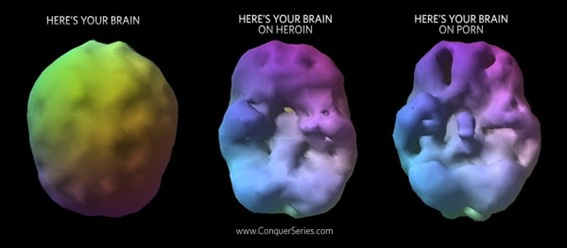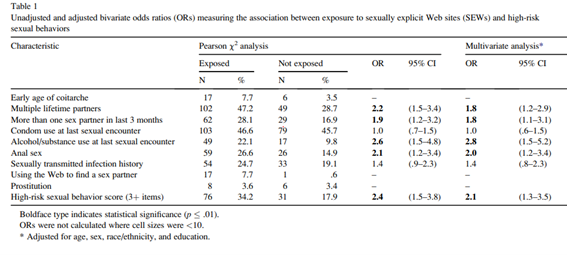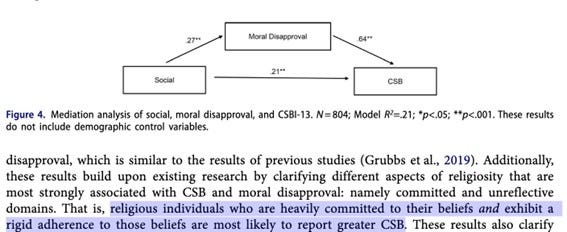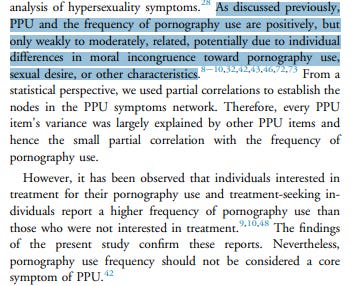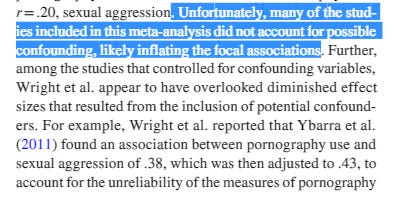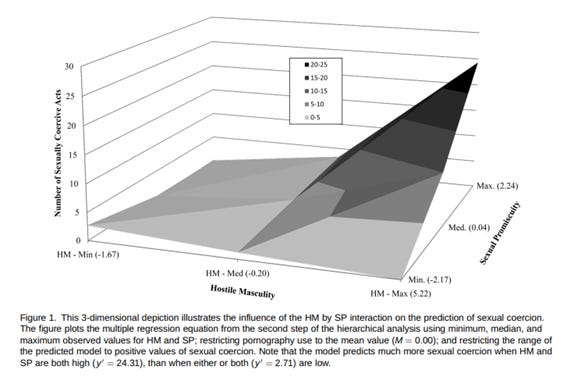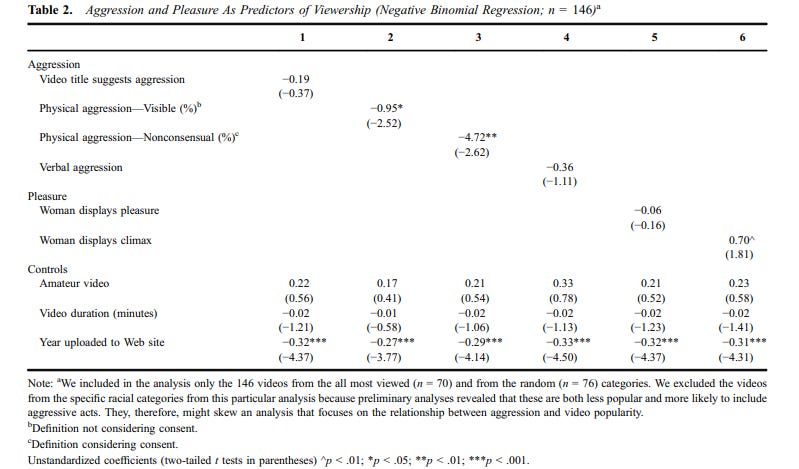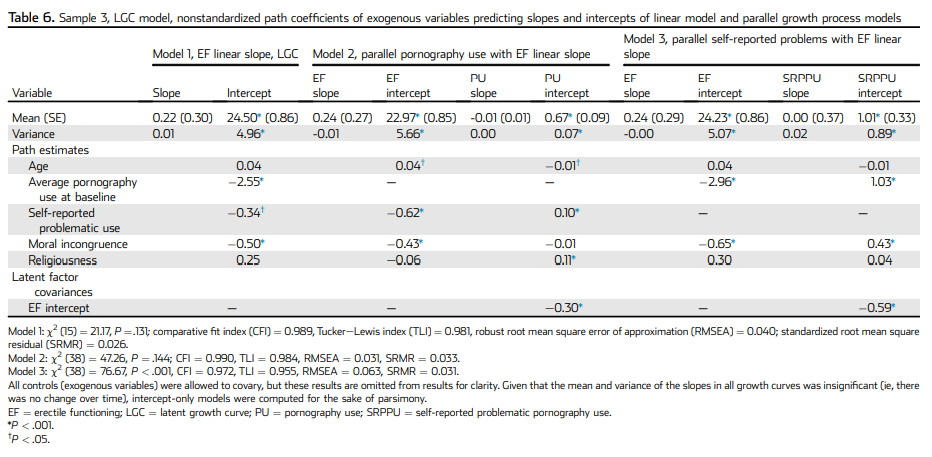No, porn alone is not the problem.
The supposed negative effects associated with pornography are misguided at worst and simplistic at best.
Ways to live and enjoy sexuality, there are many, we are all a different world and we all seek varied experiences or there are those who show no interest, one of the ways in which many people choose to enjoy is through pornographic material, whether real, fictional, etc.. But, as it is to be expected from something related to sex, there is quite a big opposition and many try to justify panics appealing to supposed harmful effects of consuming such material or that this in itself represents a problem. Reasons mentioned by different groups, mostly conservative, to oppose porn have been many and varied: A great part of these claims seek to relate porn as the cause of many sexual crimes, addictions, social problems, etc.
But is there a scientific justification for these claims to be taken into account? In this update of an old blog, I will review some of the ones that are made and we will see that they are not causal effects or in some cases, there is no such problem.
Contents:
>The problem with Dopamine.
>Problems with the popular model of addiction.
>The "changes" in the brain
>Till porn do us part
Moral incongruence and alleged "harms" >Porn and sexual aggression
>Porn and sexual assault
Erectile dysfunction and other physical effects >Erectile dysfunction and other physical effects
>Alleged altered perception
>Conclusions
The problem with Dopamine
One of the most touched points, and possibly one that many have encountered, is the assumption that pornography represents "an addiction problem as serious as marijuana or other types of drugs because of the reaction in the brain, related to dopamine and pleasure that will provoke an addiction in whoever experiences it".
This will be quite long because there are many issues involved in a single statement, but to begin with, a mistake is made in assuming that simple drug use can necessarily lead to an "addiction", to give an example, in this 2017 annual report, it is estimated that some 250 million people used drugs at least once, and of those only 29.5 million (11.8 of the total approx.) suffered from disorders associated with drug use, as we see the figure of problematic use even in drugs is quite low to how it is planet as a domino effect of falling (1)
It is well known that in reality only a part (sometimes very small) of people who consume a psychoactive substance develop a real "addiction" (2) and this is because not everything is merely neurological, not even if we talk about drugs that by themselves may not necessarily be "addictive", but are moderated by separate factors such as poor family containment, stress, depression, anxiety, etc.. My argument states that when even drugs having a far stronger effect on people at the neurological level by themselves may not cause an "addiction" (You will see below why the quotation marks), but depend on factors associated with the environment and also the personality it is very likely that pornography cannot be considered "addictive" by itself, even if there is a continuum of drug use where one can use them without true dependence
From this point, let us now focus on dopamine, yes, that neuroreceptor related in part to the reward system, first we have to clarify that there is a big difference to the reward system beyond the similarities in the mechanism of action, one of these differences is the increase in the concentration of dopamine in the synaptic space and the prolongation of its effect when a drug acts something that does not happen with pornography or other stimuli: Dopamine is also released when walking, doing an extreme sport, etc. As explained here (3)
"The areas of the brain that become more active are much like other non-sexual rewards" (p. 436), whether it is the use of illegal substances or simply the consumption of "a preferred brand of chocolate."-Pg.4
I should also add something, and that is that the brain of a brain addicted to X thing cannot be generalized to an addict to Y, since different areas of the brain are involved in different, but overlapping, areas. So, just because sexual stimuli turn on one part of the brain doesn't represent much of the truth (4).
As a way of answering with the same stone to those who cite this argument, this study found no evidence to suggest that pornography leads to a significant alteration of dopamine receptors (although as I will explain later, this is only useful for those who cite similar references, because the sample is small and difficult without a model to draw better conclusions) (5)
Also, when discussing these types of studies on the neurology of porn "addiction", one must always tread carefully, as this line of research suffers from quite significant problems as explained in this review of 371 studies it has been seen that much of this work is characterized by simplistic methodological designs and a lack of integration without adequate controls for confounding factors, which as we saw are important (3).
Problems with the popular model of "addiction".
Not only the neurological model as we saw fails in many aspects, but also the "popular" one, here something comes into play: The high abstinence rates, that is, that many people are able to quit porn without problems.
As a first point, and despite what you may think, there is neither in pornography or even drugs an agreed definition of what is considered an "addiction". Because of this, I will base this point on a more or less agreed definition of "compulsive sexual behavior disorder" given by the ICD-11, the one we are interested in is the one that mentions that the person is unable to reduce or otherwise stop the behavior.(3)
Another criterion is harm not associated with external factors such as incongruence, but we'll get to that later.
I think many of us have heard that, that an addict is one who cannot stop performing certain behavior despite their best efforts, and putting it in context, that pornography does that: that many, as supposedly with drugs, are not able to break free from this.
Well, this will come as a surprise to many, in reality it is seen that most people who meet certain criteria for "excessive pornography use" stop being pornography abusers quite easily.
This paper which looked at 2 longitudinal studies, e.g. (6) , found that using the same DSM "addiction" criteria, most people who are classified as having a pornography use problem stop using it over time quite easily.
With withdrawal being understood in this part as "unpleasant" states (such as anxiety, irritability, etc.) after a behavior or substance is discontinued, this study found that once people were told to abstain from viewing pornography, there was no evidence of such symptoms - the one we are most interested in is related distress - after a seven-day follow-up (7).
-Although negative effects may occur when frequent and problematic use are high, these as we said will not be generalizable to most and in fact these individuals already had pre-existing problems.
At first glance, pretty weak addition if you ask me, but something curious is that the first study of these two obtained the same result for other "addictions" such as gambling and, the one that matters to us for those who make the analogy, drugs, because another of the biggest mistakes made by those who try to analogize pornography with drugs are the high abstinence rates (in this case, understood as the ability to quit with relative ease), this was previously exposed both in the low prevalence of people with associated disorders in drugs as in the aforementioned study, but also in these studies:
For example, in this study with a sample size at the end of 431 people who were heroin users, after 11 years of follow-up, the majority of people stopped using heroin over the time studied (8).
And in this (9) , using a large sample of people who fit the DMS-IV addiction criteria, who used nicotine, alcohol, cannabis and cocaine, there was a high remission rate over time for all groups.
You see, this shows that if porn is as addictive as drugs, it is a fairly easy one, even more so, to break since even those who use hard drugs can do it; the same would be expected of porn and in fact, the evidence is more in favor of this. Individual factors are things to take into account, because nothing here is that simplistic.
The "changes" in the brain
I believe, and contend, I am not the first who has come across points about how pornography supposedly "destroys the brain", it usually comes accompanied with the addiction point, the ways in which this argument is presented are varied, so I will try to touch on the two most mentioned and how these, to their disgrace, fail.
- "Porn ruins your brain worse than heroin."
What is the source of this? Well, this image
Image easy to understand, and that can catch more than one, but where does it come from? Hold on, because it turns out that this image apparently DOES NOT EXIST.
The image does not seem to come from any scientific article, there is nothing when you look for it or a reference behind its possible origin. It is TOO likely that it is an unpublished image, we do not know the type of analysis that was done or the profile of the sample, nor the size of the sample which appears to be from a single unknown person, this article (10) has more information about this very suspicious image, which is impossible to take into account as it is ultimately what is considered cherry-picking . As a side note, the oldest known source of the image comes from a for-profit anti-pornography organization, which so far has not given as you see in the article details of the research behind this image, so this increases suspicions a bit.
- "Porn reduces your gray matter"
Where does this statement come from? Well at least here if we have something to work with, it comes from a research by Simone Kühn (11) where she observed that men who watched more pornography had less gray matter than those who did not watch as much.
However, we must keep in mind that the study was cross-sectional, impossible to draw any causal conclusion, and the same source suggests an inverse relationship, i.e. that the previous change makes porn consumption more gratifying, never involving causality, this same statement being repeated in the Abstract and conclusions.
And apparently, leaving aside that OLC regression shows a lot of deviation, which indicates many measurement errors, another major problem of this research is the very small sample (64 people) which, added to the design of the study and the lack of a model that allows an explanation, makes it difficult to draw any causal conclusions (12).
And if we go even deeper into the situation of neurology in this field, there is more material to cut, considering that this research mentioned above is only the first one. On the neurobiological level, I will cite the 25-year review of porn addiction (3), a review of 415 studies in total that analyzes the current state of the literature and much of this work is characterized by simplistic methodological designs, a lack of theoretical integration and major reasons along with an absence of quality measurement.
-pag.23
-pag.34
Till porn do us part
Now we enter the realm of social issues, in this case love relationships and marriage; given the status they have and the in most cases negative implications for the parties involved when they end, it is to be expected that an accusation of something that is destroying them will attract a lot of attention. However, in the case of pornography, it's not so simple when it comes to the relationship between porn and relationship failure.
Speaking specifically about marriage, research in this area finds that pornography use linearly predicts a greater desire to marry for single men (13).
This other one finds that at least moderate consumers (here understood as watching between 1 to 3 programs per year) have a higher probability of getting married, women have a high probability regardless of whether they watch porn or not (14) and this research shows that among single men it does not discourage them from getting married either (15).
I want to clarify that I do not assume that pornography is a sufficient factor for someone to want to enter into marriage, that would be simplistic considering how unique we all are (This will be very important later), but the evidence points to the fact that there is no reason to believe that porn will have the opposite effect.
Speaking of romantic relationships, in the research looking at sexual satisfaction in relationships in all the samples I have found (17) and we appreciate above partially with marriage, when women look at porn they have more sex and sexual satisfaction, but this effect is not present in all men. The big question is why? What happens is that even if the correlation between pornography and poor relationship quality is true, but we cannot draw causality from this, the explanation behind this relationship is most likely due to three important factors:
A) The form in which pornography is consumed (Solitary or couple).
B) The perception of either or both parties about porn.
C) Moral incongruence (When actions about pornography use do not match acts).
On point A, this study (18) of 200 heterosexual couples found that viewing pornography together was associated with better sexual communication and closeness compared to use by only one partner.
This 2021 research (21) found that women who interpreted their partners' pornography use more positively or neutrally enjoyed greater relationship satisfaction and sexual satisfaction.
This 2021 study (22) again found that behavioral porn use was positive for relationships, solitary porn use was not. Although as it mentions, when couples did not watch it they did well, but clearly this has no bearing on the point of whether porn harms relationships per se.
This 2019 study, when taking into account how pornography is consumed, whether alone or with a partner, found that, after controlling for this factor, porn went from having a significant association to having virtually no association with poor relationship quality (23).
As you can see, the relationship between pornography use and relationship quality is not causal, but as expected it most likely depends on how the couple handles pornography use, in this case when it is joint or there is no stigma behind it.
Of course, solitary use of pornography is associated with poor relationship quality, but there are reasons to believe that this relationship is not causal, and that is attitudes and/or opinions about pornography.
This study (24) of 6626 heterosexual couples found that acceptance of pornography moderates the association between pornography use and relationship satisfaction, with lower acceptance being correlated with lower satisfaction for both men and women.
This other showed that while pornography was associated with low sexual satisfaction among American men (not women), among less religious men, this negative association essentially disappeared, which should be understood in terms of how rigid adherence to religion can lead to these discomforts given that many of these beliefs condemn porn (25).
Another study by the same author (26) found that, for married pornography users who morally disapproved of pornography, their marital quality over a six-year period decreased as their viewing frequency increased. Importantly, this was not the case for married pornography users who did not disapprove of pornography; their viewing frequency was not associated with marital quality over time.
A similar result the first was found in this 2021 study (27) finding that negative attitudes toward porn were associated with lower rates of social and emotional intimacy.
These findings suggest to us that the connection between pornography use and sexual satisfaction, especially for men, depends largely on what viewing pornography means to consumers and their moral community and less on the practice itself. Each couple must decide whether pornography use is acceptable within their romantic relationships and talk about its use and how they would like it to occur with their romantic partners, relationships between people are unique and governed by different dynamics, but these findings suggest to us that blaming the content alone given the very likely explanation behind it is misguided.
By the way, speaking specifically of solitary consumption in another light, haven't you heard that pornography kills the ability to be able to relate sexually to real people?
If so, I must say that the evidence doesn't support this either.
This study of a total of 433 teenagers (28) shows that those who watch porn have more sexual partners, it doesn't sound to me like it kills their ability to relate to real people.
-I must emphasize that when talking about this group, I am fully aware that with a good training thanks to ESI and a good social environment we can ensure good sexual and reproductive health-
And in fact (29) people who watch porn, oh surprise, still have sex.
This is not to say that pornography will necessarily lead people to have more sex, this is something that will depend on individual factors and experiences such as sociability, but there is no reason to believe otherwise.
Moral inconsistency and alleged "damages"
Another of the most talked about relationships in all pastes against pornography, is to relate it with mental health problems such as depression, psychological distress and erectile dysfunction.
Admittedly, there is a correlation with respect to the first two, but as always this does not imply a coincidence because there may be different mechanisms by which this correlation occurs, one of the most successful is that of moral incongruence.
Simply put, moral incongruence (30) is defined as when one's beliefs about pornography-related domains are incongruent with one's actions, such as viewing or using pornography. This model shows us a pathway by which people consider pornography use problematic for themselves and also that such incongruence leads to the aforementioned problems, which tells us that the causal problem lies with the person and not with the porn itself
This is a model that allows us to explain why such correlations occur, and has a good deal of data to support it. The meta-analysis above finds that moral incongruence toward pornography is associated with self-reported problems, and along with it we also have other evidence in favor of this explanation.
For example, applying it to a more general framework, this study (31) found that the strongest predictor of symptoms related to compulsive sexual behavior (CSB) was moral disapproval, especially if they were more rigidly adherent to religion.
This as I said is general since CSB encompasses other behaviors, but it helps us illustrate how moral disapproval of sexual behaviors can be the real trigger for problems, and in the case at hand, pornography assumptions.
Focusing specifically on porn now, this is a really consistent finding! It is found in Malaysian samples (32) and US samples (33)nationwide and longitudinal studies and other research that replicate and support the evidence in favor of the incongruence model (34).
People who use frequently, but do not morally disapprove of pornography use or who are below average in religiosity, generally do not find their use problematic and do not report problems in their lives due to use. The latter is actually a very consistent finding in the literature (35).
Frequency of pornography use predicts problematic use, but has not been shown to be a single cause (people can use pornography frequently and not be problematic users).
Problematic use and frequency of pornography use are positively related, but only weakly to moderately so, possibly due to individual differences in moral incongruence, sexual desire, or other characteristics (36).
Another of the alleged harms related to pornography use is erectile dysfunction. Since this part has gone on long enough and there are still two more points to touch on, let's get right to it.
In this study (37) they suggest that higher levels of "problematic pornography use"-Eye on the semantics-may be associated with more sexual functioning problems. Conversely, higher frequency of pornography use may be associated with fewer sexual functioning problems in men and women as well, although the relationships are not entirely conclusive, there is no reason to believe that pornography necessarily leads to these problems.
And this systematic review (38) finds that pornography use does not impair sexual functioning. This topic is still somewhat more extensive, so I'll leave this article (39) that explains the problems with such a relationship, not the least of which are the poor quality of the data given the multiple samples and profiles that exist on an alleged increase in porn-related erectile dysfunction and the possible confounding external factors that may be present when trying to view such a relationship.
Porn and sexual assault
Time to get into the more sensitive area of pornography, possibly its most delicate accusation, its alleged influence on sexual abuse.
First, to introduce us to the subject and the problem of this argument, I will talk about what is possibly the most cited study to try to prove such a relationship; the study in question is this meta-analysis (40), however many of the studies included in this meta-analysis did not take into account possible confounding factors, probably inflating the associations. Even among the studies that did, it appears that the study omitted the diminished effect sizes that resulted from the inclusion of potential confounders, as explained here (41).
Furthermore, this meta-analysis was not subsequently replicated in this meta-analysis (42) which concludes that although we see significant associations, the effect sizes are low, added to the fact that these investigations that find a relationship have been weakened by methodological errors that may overestimate the effect and that these significant effect sizes may disappear after controlling for theoretically important variables.
Speaking of theoretically important confounding variables, which ones are we talking about? And in what model can they be explained? Well, we can explain such findings by the "mediational confounding model (43) where a large number of interactional constellations (rather than cumulative ones) associated with sexual offending such as antisociality (44 -Review of 80 studies) and hostile masculinity (45) placed in two pathways prior to consumption will trigger offending, showing the negative association with pornography.
Basically, that pornography use increases the risk of sexual assault ONLY for those men who are already predisposed to sexually assault (46).
Men who are not predisposed are unlikely to show an effect; if there is indeed an effect, it is likely to be transient because these men would not normally seek out violent pornography (47)
Aparte de estos, este es un resultado que ha sido bastante probado:
Por ejemplo, este estudio de 2015 (48) encontró que entre los hombres de bajo riesgo (Quienes puntuaron menos en masculinidad hostil y promiscuidad-Aunque este segundo es más complicado, como veremos pronto-) tenían muy pocas posibilidades de agresión sexual, a diferencia de quienes si puntuaron alto.
This slightly more recent review (49) points out how the effect of pornography on aggression has only been established in those predisposed to aggression primarily through individual characteristics such as antisocial or aggressive tendencies.
-pag.60
-pag.58
However (50) this study did not find that pornography use or impersonal sexuality (promiscuity comes into play here) increased the risk of reporting sexual assault, but hostile masculinity did. The study could not find a role for pornography independently of the risk of the participants, this very possibly tells us that there is a certain group already predisposed that will show a certain effect, but another not given in this case very possibly cultural differences: We must take into account the complexity of these relationships given many possible variables, but in both, as you see, pornography is not by itself responsible for the increase in aggression.
Well, having touched on this topic, let's move on to another point related to aggression.
You may have heard that most pornography is "violent" or that this type of content is very popular?
The quotation marks come because when it comes to proving this, these studies have mostly lousy and very general definitions of "violence".
For example (42) this study wanted to show that 12% of the videos on the top sites show some kind of sexual violence, but this study cannot represent a convincing result. First, the study used phrases that do not themselves imply some kind of sexual violence, for example the most popular was... "teenagers", and others that involved taboos such as "incest", "stepmother",or even words like "money". Now, before you bring out the torches about those terms in many real cases being accompanied by violence, these studies label this regardless of the context, there is no attempt to differentiate the description from the actual content shown (Was it her stepmother? Was it sensationalist text?,etc). Even words like rape were only seen in 1 out of 131,000 videos and "assault" only present in 4 titles, or .00003.
And also, the evidence points to the fact that (ignoring measurement issues such as only cataloging the act in the video are context) such content is equally unpopular with consumers getting fewer views and likes, as found by narrow analysis of 269 popular PornHub videos (43)
This context is important as I mentioned earlier about the 12% study, because the vast majority of violent activities that appear in porn are actually standard elements of consensual BDSM, as this study reviewed 23 studies on pornography and concluded that "violence" against women in pornography is "rare" ( 44 ).
There are also many times in this crusade against pornography where isolated cases, therefore not generalizable, have been used to support this relationship. Possibly the best known and most infamous involving the serial killer Ted Bundy and his statements about the role of porn in his life as a murderer.
However, this statement has its problems...In a 1980 interview, Ted himself mentioned that pornography played an insignificant role in his development as a serial killer. Most biographers agree that it was a way for him to avoid charges, as when he blamed detective magazines for this
(45). Ted knew the legal system from having been an outstanding law student, knowing that if the jury felt his crime was influenced by something outside himself they would not sentence him to death. Of course, they could argue that taking into account what a murderer says is not valid...And that flies in the face of those who claim in this case that he was influenced because all we have of this alleged influence is Ted's testimony and not concrete evidence or analysis.
Erectile dysfunction and other physical effects
At this point we will touch on the physiological arguments that are based on the idea that masturbating, and especially watching pornography, causes a lot of physical health problems, ruining one's life and sexual or general health... One of these effects is related to erectile dysfunction, the persistent or recurrent inability to achieve or maintain an erection of the penis, for which many, especially desperate men, point to pornography as the cause. But: How accurate is this statement, and what is it based on? Regarding the first question, the best realiAdo studies I have found show that no such causal relationship appears to exist, for example this study (46) done on 3 samples of men found that among sexually active men who consume pornography, serious erectile problems appear to be rare.
In this 2015 study of two samples (47) the use of poenography was not significantly related to erectile dysfunction in sample 1 and although there was a relationship in sample 2, it was weak...In addition, men who watched more porn were not significantly related to erectile dysfunction in sample 2. 2 there was a relationship, it was weak...Furthermore, men who watched more porn were not more porn was not characterized as having more erectile dysfunction.
And this study from Hungary (48) could not find a significant correlation between porn consumption and erectile dysfunction, however, all these studies are based on self-report and therefore should be taken with caution, but equally this is complemented by the fact that to explain the lack of such relationships we have the aforementioned model of moral incongruence where it is the perception of problematic use of pornography given previous beliefs that, given the context of the person, cause erectile dysfunction. This study therefore explains that such a relationship may, I mean MAY, exist only in men already predisposed by risk factors to sexual problems. Ex: young and inexperienced men. This proven model allows to give an explanation to these negative and possible positive results by explaining them
.
And of course, let's not forget the known confounding and risk factors for erectile dysfunction that can affect the relationship and are more likely to cause it, such as smoking(50), drinking (50 ), diabetes (51 ), etc.
And on what these affirmations are based, leaving aside personal testimonies, because they are based on supposed statistics that reveal an increase in the rates of erectile dysfunction in young people... To avoid making this longer, this article explains the problem of these studies (52) as the samples and statistical results vary too much from study to study, making it difficult to draw conclusions To finish this section, have you heard that masturbation somehow reduces testosterone? Well, it is more complicated than that...
For example, this study found that, among male participants, a higher frequency of masturbation was found to predict higher testosterone levels (53 )
.
Of course, this study has limitations like others cited, so I see the need for more research and models to be developed to explain these relationships, however, there is no reason to believe that self-pleasure will somehow reduce testosterone. This reminded me of a supposed study that claimed that abstinence was a way to increase testosterone...In reality, although the study found that abstinence led to an increase in basal testosterone level, there was no change in the typical response of the body to abstinence. organism (54) is therefore Insufficient
Alleged altered perception
Something that I have read a lot in networks, and honestly it still annoys me, is when people blame pornographic and sexualized material as the sole cause of certain attitudes in pornographic and sexualized material as the sole cause of certain attitudes in networks of different sectors of different different communities, such as misogyny, mostly based on the argument of "pornography fucked them up so much". pornography has so fucked up their brains and perception that now they are not able to see a real or real person. able to see a real person or only think about sex."
Look, that I understand the distaste towards such attitudes on networks, but blaming pornographic content or a consumed medium is NOT the solution or what to blame : People are more complex in many ways and opinions and comments are not insulated from having that complexity. opinions and comments are not insulated from having that complexity, even if you see a trend it is only correlational with no trend is only correlational with no solid basis unless it is researched and when you do it is really all the result of a really everything is the result of a set of factors as I will explain. First let's go with the research and then the possible explanations behind it...how
this study mentions(55) there is no evidence to suggest that sexualization in video games was related to misogynistic and sexist attitudes
.
Regarding the explanation behind : Very possibly, even if a correlation is found, it would only be evident in people already predisposed by their behaviors, previous ideas, lack of ESI, etc.
On attitudes this has been evidenced in some studies (56 ), attitudes that support violence against women were evident only for men with little kindness. This is very similar to what we said earlier about porn and sexual assault (57 ,58 ).
It is necessary to understand how different factors can interact to result in attitudes such as these, and of course how they will impact the use of the attitudes like these, and clearly how they will impact on the use of the media by each person, not to reduce everything to a problem and make the rest invisible. not reduce everything to one problem and make the rest invisible...
Conclusions
This article aims to refute and qualify the alleged relationship between pornography and various problems about which it is accused and how we saw many of these are false or more complex than what might be seen at first glance. The stigma against anything related to sexuality continues to persist today, and porn or sexy content has not been spared even by those who consider themselves more liberal on the subject. porn as responsible for attitudes abound, ignoring the complexity of human problems, which we should avoid which we should avoid more. Thank you for reading this article, this is as far as we have come, I hope that you have learned something or that I have helped you if you have learned something or have helped you if you had any doubts, take care.
Twiiter: @King_Mix_Papper





